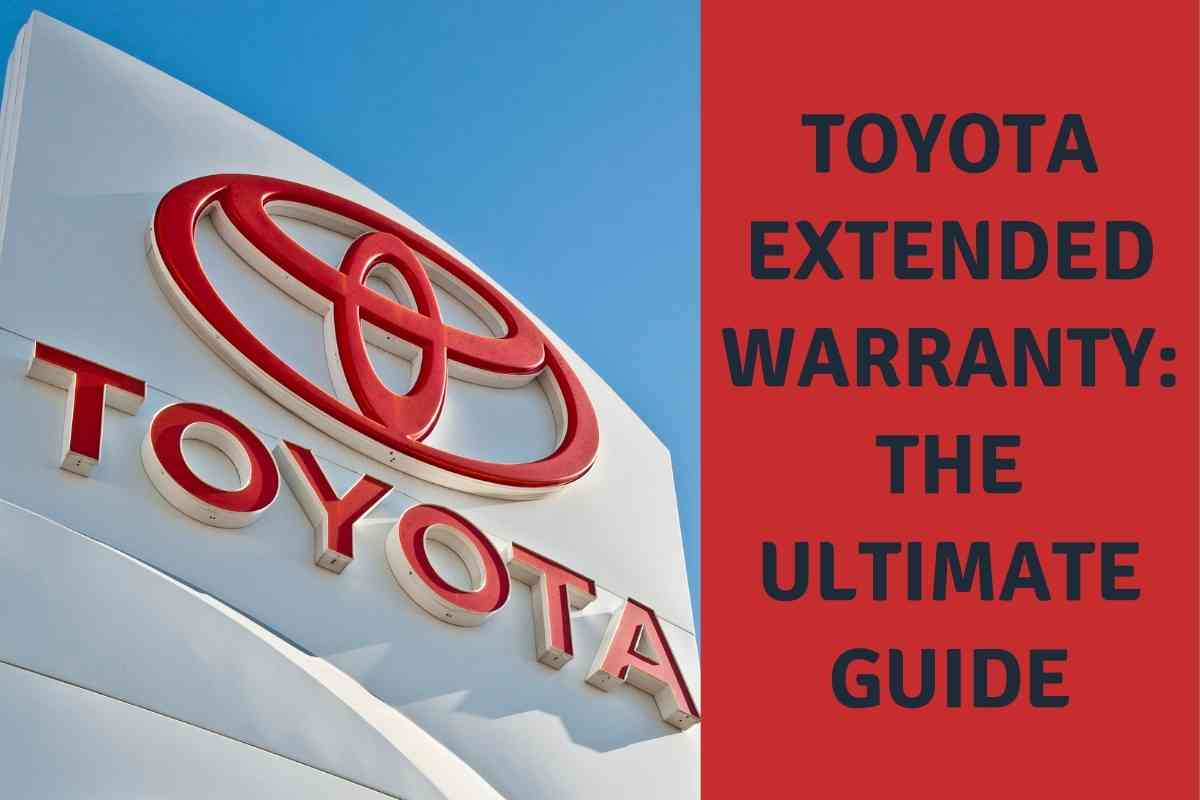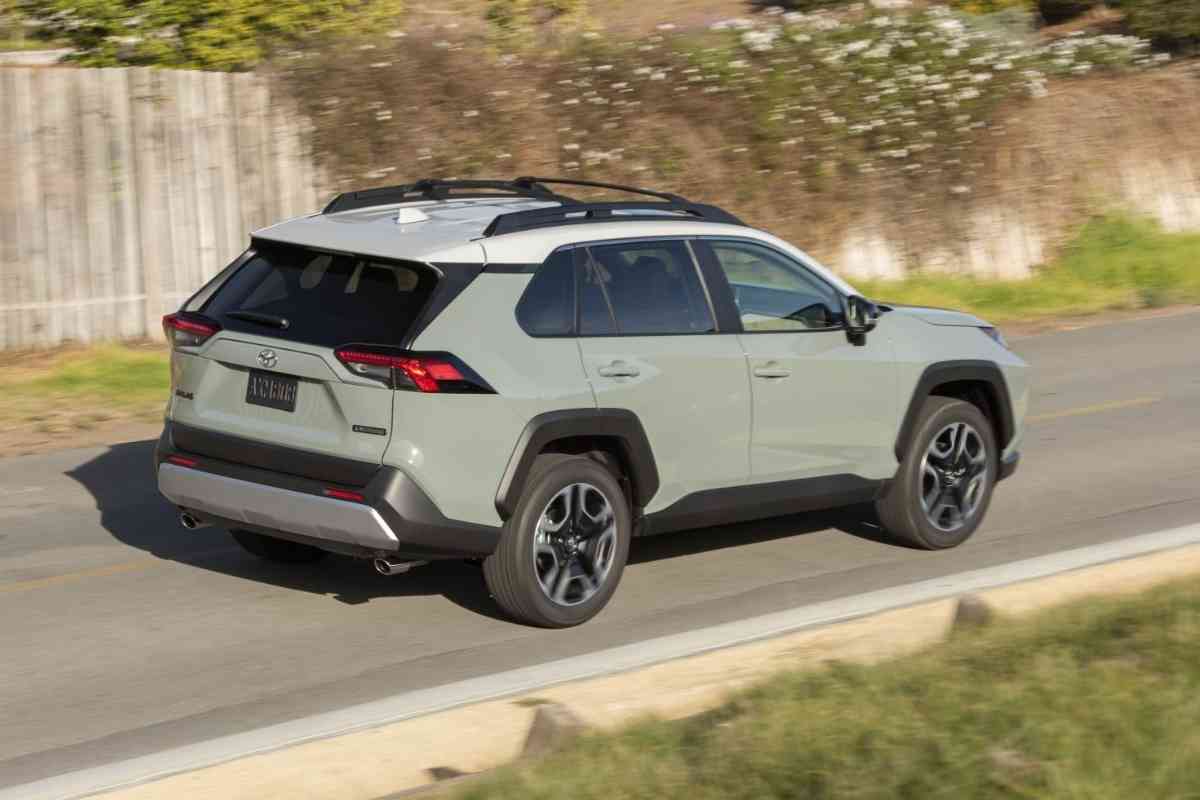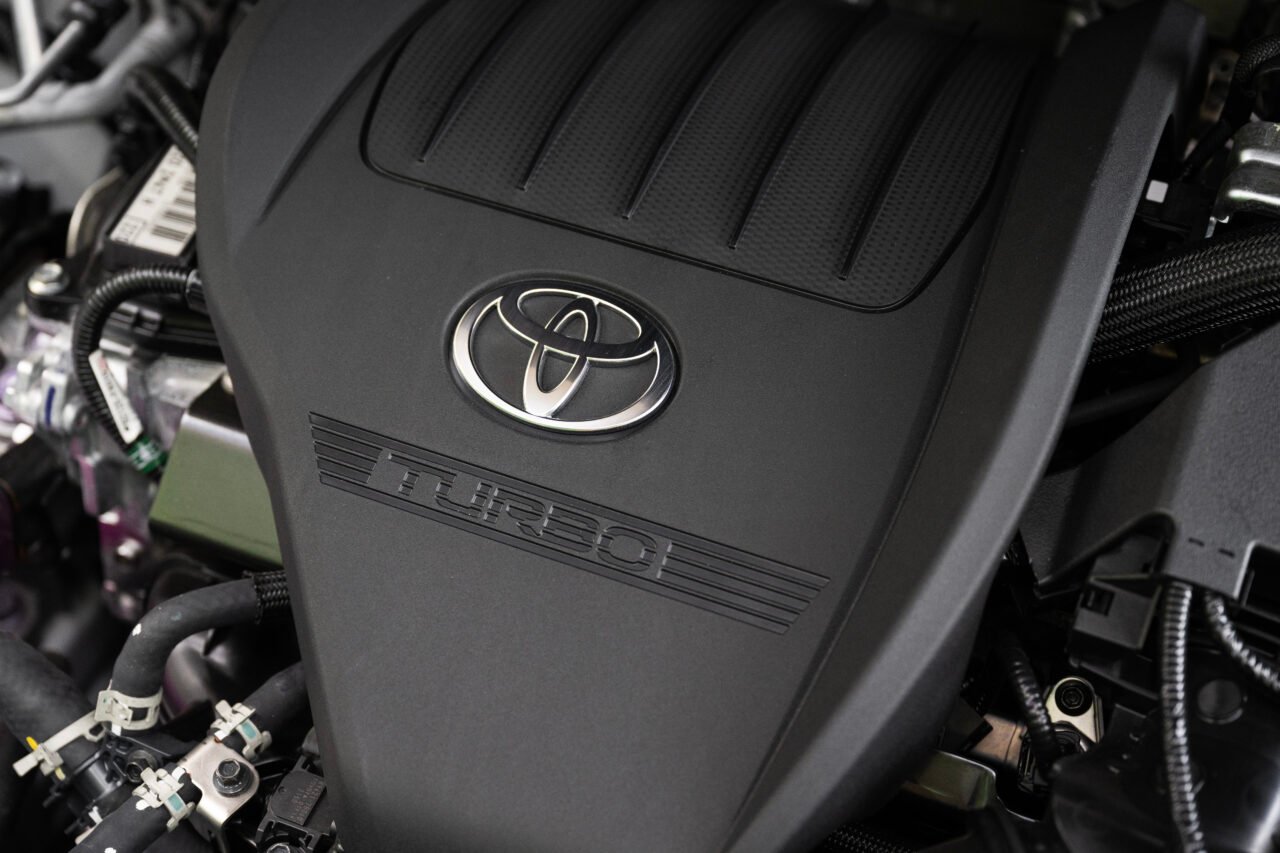Toyota Extended Warranty: Options, Prices, And Where To Buy!
Considering extra protection for your Toyota? Let’s uncover the ins and outs of the Toyota extended warranty, ensuring you make an informed decision for your ride!
I just purchased a new Toyota along with an extended warranty. From my assessment, a 10-year bumper-to-bumper warranty cost was roughly the cost of one major repair. Keep reading!

You’ve probably gotten the phone calls about your car’s extended warranty that we’ve all heard before. But I’m here to tell you that it isn’t actually as bad as it seems on the surface.
An extended warranty really can be a great way to protect your car in addition to the standard one. So what does Toyota’s extended warranty get you, and should you consider buying one?
Toyota Extended Warranty: Options, Prices, And Where To Buy!
The best extended warranty for a Toyota is ToyotaCar Plus, which is offered directly from the manufacturer itself. This service contract extends your no cost maintenance plan by up to four additional years or 45,000 miles and also includes 4 extra years of roadside assistance with unlimited miles.
When you buy a new Toyota, you automatically receive a basic warranty that covers certain things for a specific amount of time.
But what happens when that time runs out and your car needs repairs? That’s where an extended warranty comes in – it can help protect you from costly repairs down the road.
In this article, we’ll discuss everything you need to know about extended warranties for Toyotas.
We’ll cover what they are, how they work, what’s covered under them, and how much they cost.
We’ll also give you our opinion on whether or not it’s worth getting one.
In order to provide you with the best content that we can, we thoroughly research and vet all information before publishing any articles.
This way, you can read through this article (and every other one on the site) with the confidence that you’re getting accurate information.
So sit back, relax, and get ready to learn everything you want to know about extended warranties for Toyotas.

What is an extended warranty?
Before we start talking about getting an extended warranty on your Toyota or any other particular brand, make, and model of car, it’s important that we first discuss exactly what an extended warranty is.
An extended warranty is a service contract that helps cover repairs after your car’s manufacturer’s warranty expires.
It essentially acts as a safety net, giving you peace of mind in knowing that if something goes wrong with your car, you won’t have to pay out of pocket for the repairs.
How does an extended warranty work?

An extended warranty works similarly to your car’s manufacturer’s warranty in that it covers certain repairs for a specific amount of time.
The main difference is that an extended warranty lasts longer than a manufacturer’s warranty – typically, they range from one to five years.
And while a manufacturer’s warranty is included in the purchase price of your car, an extended warranty is an optional add-on that you have to pay for.
If you purchase an extended warranty, you’re paying to extend the coverage your car’s manufacturer already provides.
That way, you’ll be covered if something goes wrong with your car after your manufacturer’s warranty expires.
What does an extended warranty typically cover?
Now that we’ve answered the question, “what is an extended warranty?”
It’s time to move on to another important question: what does an extended warranty cover? Just like your car’s manufacturer’s warranty, an extended warranty will cover certain repairs.
But the coverage will vary depending on the provider, so it’s important to research before purchasing one.
In general, most extended warranties will cover things like your car’s engine, transmission, and electrical system.
They may also cover things like your car’s air conditioning system, fuel system, and suspension.
And if you have a luxury car, an extended warranty may even cover things like your car’s infotainment system and navigation system.
Of course, it’s important to keep in mind that not everything will be covered under an extended warranty.
For example, things like your car’s tires, brakes, and oil changes are typically not covered.
And while an extended warranty may cover repairs to your car’s engine, it likely won’t cover things like routine maintenance or tune-ups.
Do car brands have extended warranties or are they third-party?

Now that we’ve talked about what an extended warranty is and how it works, you might wonder if car brands offer their own extended warranties or are all provided by third-party companies.
The answer to this question depends on the car brand.
Some car brands, like Toyota, offer their own extended warranty program.
This program is called “ToyotaCare” and it covers repairs for two to three years after the expiration of your car’s manufacturer’s warranty.
Other car brands like Honda do not offer their extended warranty program.
Instead, they partner with third-party companies to provide extended warranties to their customers.
What is covered under Toyota’s extended warranty?
We briefly mentioned Toyota’s extended warranty program, called “ToyotaCare,” earlier.
But what exactly is covered under this program? Let’s dig deeper into the policies and coverages associated with this extended warranty so you know exactly what you’re getting yourself into.
Toyota Care is a no cost maintenance plan that also includes 24-hour roadside assistance in most locations.
Under this plan, eligible Toyota vehicles will receive factory-recommended maintenance services for two years or 25,000 miles, whichever comes first.
This means that all normal wear and tear items like oil changes, multi-point inspections, tire rotations, and so on are covered under the plan.
In addition to these basic maintenance services, Toyota Care also provides 24-hour roadside assistance.
This includes flat tire changes, jump starts, towing to the nearest Toyota dealership (up to five miles), and lock-out assistance.
If you have any problems with your car while on the road, Toyota Care will be there to help you.
Now that we know what’s covered under Toyota Care, let’s take a look at how much it costs to extend this coverage.
How much does it cost to extend Toyota Care?
If you decide that you want to extend your Toyota Care coverage, you have two options: the standard plan and ToyotaCare Plus.
The Standard Plan covers all of the same maintenance services as the original Toyota Care plan, but it extends the coverage to three years or 36,000 miles, whichever comes first.
The cost of this plan is actually included on every new Toyota.
So if you purchased your Toyota new from the dealership, you’re automatically enrolled in this plan.
The premium plan, also known as ToyotaCare Plus, builds on the Standard Plan by adding a few additional coverages.
To qualify, your Toyota vehicle has to have 31,000 miles or less and you also have to be within 37 months of the date the vehicle was put into service, or what Toyota refers to as the first use date.
Note that this is NOT your purchase date!
So basically, if you let the standard maintenance plan run its course, then you can immediately enroll in ToyotaCare Plus for around $300 to $350.
That will provide no lapse in coverage and give you the best-case scenario. But what is ToyotaCare Plus?
This extended warranty program includes all of the same maintenance services and roadside assistance as the Standard Plan.
However, it also adds four additional years of coverage and an additional 45,000 miles for a total of six years or 71,000 miles.
In addition, ToyotaCare Plus provides trip interruption reimbursement of up to $500 per occurrence if your Toyota has a breakdown more than 100 miles from home.
This can be used for things like meals, lodging, and transportation.
So now that we know what’s covered under Toyota’s extended warranty plans and how much they cost, let’s discuss whether getting one is worth it.

Are extended warranties worth it on most other cars?
This is a difficult question to answer, as it really depends on the individual circumstances.
In most cases, we would say no, extended warranties are not worth it.
The reason being is that most cars these days are built to last well beyond the length of an extended warranty.
And if you have any problems with your car, they’ll usually be covered under the manufacturer’s standard warranty anyway.
However, there are a few exceptions where we would say yes, an extended warranty might be worth it.
For example, if you live in an area with harsh winters and lots of salt on the roads, that can take a toll on your car’s underside and lead to premature rusting.
In this case, an extended warranty that covers corrosion could be worth the extra cost.
Another exception might be if you’re planning on keeping your car for a long time.
In this case, an extended warranty can give you peace of mind knowing that you won’t have to pay out of pocket for any major repairs down the road.
Of course, there are other factors to consider as well, such as your driving habits and the type of car you own.
Ultimately, deciding if an extended warranty is worth the cost is up to you.
If you decide that an extended warranty is right for you, there are a few things to remember when shopping around.
First, make sure to get quotes from multiple companies to compare coverage and prices.
Also, pay attention to the deductible, as this can vary significantly from one plan to the next.
And finally, be sure to read the fine print so you know exactly what’s covered and what’s not.
Is it worth it to get an extended warranty on a Toyota?
Now that we’ve answered whether extended warranties are worth it in general let’s specifically discuss Toyota extended warranties.
In our opinion, yes, it is definitely worth it to get an extended warranty on a Toyota.
The reason being is that Toyotas are built to last and they have an excellent reputation for reliability.
So if you’re looking for peace of mind down the road, an extended warranty on a Toyota is a wise investment.
When shopping for a Toyota extended warranty, be sure to get quotes from multiple companies so you can compare coverage and prices.
Also, pay attention to the deductible as this can vary significantly from one plan to the next.
And finally, be sure to read the fine print so you know exactly what’s covered and what’s not.
If you’re looking for an extended warranty on a Toyota, we recommend getting the ToyotaCare Plus plan directly from Toyota.
This is because it provides all of the same maintenance services and roadside assistance as the Standard Plan but adds four additional years of coverage and an additional 45,000 miles.
In addition, ToyotaCare Plus provides trip interruption reimbursement of up to $500 per occurrence if your Toyota has a breakdown more than 100 miles from home.
So if you’re looking for the best possible coverage, ToyotaCare Plus is the way to go.
But no matter which plan you choose, an extended warranty on a Toyota is a wise investment that will give you peace of mind for years to come.

How do you buy an extended warranty for a Toyota?
You can purchase an extended warranty for your Toyota through the automaker, a dealership, or a third-party provider.
If you buy from the automaker, it will be called a factory-backed extended warranty.
These plans are usually more expensive than third-party options but may offer better coverage and customer service.
If you purchase an extended warranty through a dealership, it will be called a dealer-backed warranty.
These plans are often cheaper than factory-backed warranties but may not offer as much coverage.
There are also a number of independent extended warranty companies that sell plans that can be used on any make or model of vehicle.
These third-party warranties are usually the most affordable option, but it’s important to research to ensure you’re getting a good deal.
When shopping for an extended warranty, be sure to compare coverage and prices from multiple providers.
Also, pay attention to the deductible, as this can vary significantly from one plan to the next.
And finally, be sure to read the fine print so you know exactly what’s covered and what’s not.
If you’re looking for an extended warranty on a Toyota, we recommend getting the ToyotaCare Plus plan directly from Toyota.
This is because it provides all of the same maintenance services and roadside assistance as the Standard Plan but also adds all of the extra coverage we described above.

Which third-party companies sell extended warranties for cars?
If you’re not interested in Toyota’s extended warranty, a few other companies sell them.
Endurance is one company that offers an extended warranty for Toyotas.
Another is CARCHEX.
Both companies offer similar coverage to Toyota’s extended warranty but may have different prices and terms.
It’s important to compare all of your options before deciding whether or not to purchase an extended warranty.
Before you decide to buy an extended warranty, you should also consider the potential drawbacks.
One downside of an extended warranty is that it can be difficult to cancel if you change your mind later.
Additionally, some people feel like they’re being taken advantage of when they have to use their extended warranty because the repair bills are often very high.
If you’re still undecided, there are a few things you can do to help you make up your mind.
First, try to get an estimate of how much repairs would cost without an extended warranty.
This will give you a better idea of whether or not the coverage is worth the price.
You can also talk to people you know who have extended warranties and see if they’ve had any positive or negative experiences.
Ultimately, the decision of whether or not to purchase an extended warranty is up to you. If you decide to buy an extended warranty, you should keep a few things in mind.
First, make sure you understand the terms and conditions of the warranty. Some warranties have a lot of fine print that can be difficult to understand.
Additionally, be sure to keep track of your extended warranty’s expiration date.
You don’t want to be caught off guard when it expires and you’re left with no coverage.
Finally, remember that an extended warranty does not replace regular maintenance.
Be sure to keep up with your car’s scheduled maintenance in order to avoid any problems down the road. By following these tips, you can be sure that you’re getting the most out of your extended warranty.
Now that you know all about Toyota’s extended warranty and some other options, you can make an informed decision about whether or not it’s right for you.
Be sure to do your research and understand all of your options before making a decision. And remember, an extended warranty is not a replacement for regular maintenance.
By following these tips, you can be sure that you’re getting the most out of your investment.

Why do we get spam calls about our car’s extended warranty?
You’re not alone if you’ve ever gotten a spam call about your car’s extended warranty.
Many people have received these calls, and they can be very frustrating.
So why do we get them?
You might get a call about your car’s extended warranty for a few different reasons.
First, it could be that your car’s manufacturer is trying to sell you an extended warranty.
These calls are usually automated and they often come at inconvenient times.
Additionally, third-party companies that sell extended warranties may also make these types of sales calls.
They may use lists of people who own cars coming up on their warranty expiration date to target potential customers.
Another possibility is that scammers are using the extended warranty as a way to get your personal information.
They may claim that they need your information in order to process a refund or a warranty replacement.
Or they may say that you’re eligible for a free trial of their extended warranty service.
Once they have your information, they can use it to commit identity theft or other fraud.
If you get a call about your car’s extended warranty, there are a few things you can do to protect yourself.
First, don’t give out any personal information over the phone.
If the caller says they need your Social Security number or credit card number in order to process something, tell them you’ll call back and hang up.
Second, if you’re not interested in purchasing an extended warranty, just say no and hang up.
You don’t need to listen to a sales pitch.
Finally, if you think you may have been the victim of a scam, contact your local Better Business Bureau or the Federal Trade Commission.
By following these tips, you can protect yourself from extended warranty scams.
And if you ever do receive one of these calls, you’ll know exactly what to do.
Share Your Insights With US
Did we forget something, get something right (or wrong)? We’d love to hear your insights! Share your automotive experiences based on our article in the comments below. Your input enriches our community’s knowledge. Thanks in advance for sharing!
What are regular car warranties?
Now that we’ve exhausted just about all there is to talk about when it comes to extended warranties in general (and especially those applicable to Toyotas), let’s talk about regular vehicle warranties.
This way, you’ll be able to see the difference between standard warranties and the extended warranties we’ve been going on and on about all this time.
In the most general of terms, a warranty is a type of guarantee.
When you purchase a product, there’s always a chance it could be defective somehow.
Whether it’s a new car or a new toaster, there’s always going to be that slight chance that something could go wrong with it.
And when something goes wrong with an item that you just bought, it’s usually pretty frustrating.
This is where warranties come in
A warranty is basically a guarantee from the manufacturer that they will fix any problem you have with their product, free of charge, within a certain period.
Now, there are different types of warranties.
There are manufacturer’s warranties provided by the company that made the product.
And there are also dealer warranties provided by the place where you purchased the product.
For our purposes, we’re going to focus on manufacturer’s warranties since that’s what extended warranties are based on.
So, what exactly is covered under a manufacturer’s warranty?
Well, it depends on the product.
For example, let’s say you buy a new car (shocking we went with a car, right?).
The manufacturer’s warranty will cover any problems you have with the car within a certain period, usually between three and five years.
And it will also cover a certain number of miles, usually around 36,000 or so.
Now, this doesn’t mean that everything that goes wrong with your car during this time period will be covered.
There are usually exclusions to every warranty.
For example, regular wear and tear items like brake pads and tires are not going to be covered under most warranties.
And even if the warranty technically covers something, there’s usually a deductible that you have to pay before the warranty will kick in.
So, if your car needs a new transmission and the warranty covers it, you might have to pay the first $500, and then the warranty will cover the rest.
There are also different types of warranties.
The most common type is called a bumper-to-bumper warranty.
This type of warranty covers almost everything on your car except for those exclusions we discussed earlier.
Another type of warranty is called a powertrain warranty.
This type only covers the engine, transmission, and drivetrain of your vehicle
So, if something goes wrong with your radio or your air conditioner, you’re out of luck.
There are also different levels of coverage within each type of warranty.
For example, a bumper-to-bumper warranty might cover everything except for wear and tear items, while another bumper-to-bumper warranty might also cover those items.
It just depends on the manufacturer.
Now that we’ve talked about what a warranty is and what it covers, let’s talk about how they compare to our old friend, the extended warranty.
Regular warranties vs extended warranties
An extended warranty is basically an extension of the regular manufacturer’s warranty.
So, if you have a three-year/36,000-mile bumper-to-bumper warranty on your car, and you purchase an extended warranty that covers the same things, it will extend that coverage for an additional two years or 24,000 miles (or both).
The main difference between a regular and extended warranty is that an extended warranty costs money while a regular warranty does not.
Also, with an extended warranty, you usually have to go through the dealership to get it.
And with a regular warranty, the coverage is automatic – you don’t have to do anything to get it.
So there you have it, this has been your complete guide to extended warranties! We hope that you now have a better understanding of what they are, how they work, and what they cover. Thanks for reading!
